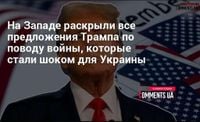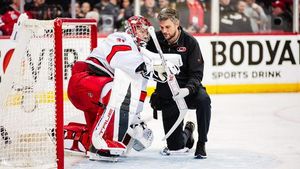In a significant diplomatic moment, Ukrainian President Vladimir Zelensky and former U.S. President Donald Trump met on April 26, 2025, during the funeral of Pope Francis in the Vatican. This encounter marked their first personal meeting since a heated exchange in the Oval Office earlier this year. The discussions reportedly focused on the ongoing conflict in Ukraine and U.S. plans to negotiate an end to the war, which many in Ukraine view as favoring Russia.
According to The Washington Post, Zelensky seized the opportunity to launch a diplomatic campaign against a proposed U.S. strategy that would recognize Russia's annexation of Crimea and other territorial claims in exchange for a cessation of hostilities. This proposal has sent shockwaves through Ukraine and among its European allies, who fear that such concessions would undermine Ukraine's sovereignty.
Oleg Rybachuk, head of the analytical and advocacy organization Center for Joint Actions, noted that Trump's previous comments had characterized Putin as predictable. However, following their meeting, Trump threatened to impose new sanctions against Russia, indicating a possible shift in his approach. Rybachuk expressed hope that Trump might begin to act more decisively against Russia, stating, "Of course, we want to think that Trump will act more harshly towards Russia in the future." He cautioned, however, that it is essential to wait and see how Trump's actions unfold in the coming days.
The urgency of the situation is underscored by the fact that Trump is approaching his 100th day in office without significant progress towards peace negotiations. Rybachuk pointed out that Russia continues to launch attacks on Ukrainian cities while delaying talks, leaving the prospects for a peaceful resolution uncertain.
In the backdrop of these discussions, the U.S. administration is reportedly under pressure to fulfill Trump's campaign promise to end the war swiftly. However, the lack of substantial progress has led to frustration among U.S. allies and Ukrainian officials alike. The Washington Post further reported that European leaders have drafted an alternative proposal that better reflects Ukraine's interests, but it remains unclear whether the U.S. will consider this alternative.
The Kremlin, for its part, continues to assert its position. Kremlin spokesman Dmitry Peskov announced that President Putin is "ready to resume negotiations without preliminary conditions," a statement that raises questions about Russia's true intentions amid ongoing military advantages on the ground.
As the situation evolves, observers are left wondering how Trump's approach will impact the conflict, especially given his historical tendency to pivot in his rhetoric. Rybachuk remarked on this pattern, noting, "When Trump sharply attacks Putin, on the second day he begins to attack Zelensky." This unpredictable maneuvering makes it challenging to gauge the implications of the recent meeting.
While the diplomatic landscape remains fraught with tension, the meeting in the Vatican represents a critical juncture. Zelensky's efforts to advocate for Ukraine's position come at a time when the stakes are extraordinarily high, and the potential for a resolution hangs in the balance. The international community is watching closely, hoping for a breakthrough that could lead to lasting peace.
In summary, the meeting between Zelensky and Trump has opened a new chapter in the ongoing dialogue surrounding the war in Ukraine. With both leaders expressing their intentions, the coming days will be crucial in determining whether this encounter leads to a more favorable outcome for Ukraine or if it simply reiterates the complexities of international diplomacy in a conflict that has drawn in global powers.




